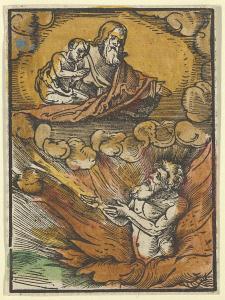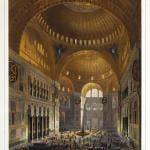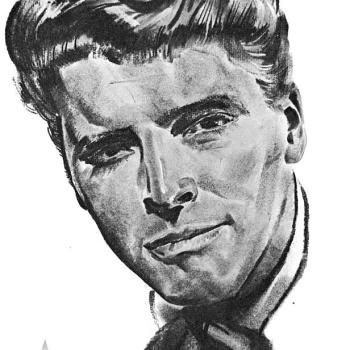
Hans Leonhard Schäufelein, 1517). Public Domain.
I spent the last couple of weeks preparing for my new podcast (Gerizim—check it out once it’s ready). I found this pursuit interrupted by a stay at the hospital on account of a long-overdue asthma attack. C’est la vie. Even before this, it had been some time since I had written, something for which I hope you reader, if you’re still out there, can forgive me. Fittingly, time in bed surrounded by COVID coughs, reading books on the American Religious Right, gave me an idea.
You see, I read two books just before my ailment and during my stay in the plague (and not plague—but that’s a story for another time) ward: Shadow Network by Anne Nelson and Christian Reconstruction by Michael J. McVicar. Each, in its way, traces the evolution of far-Right theology among American Christians (mostly Protestants). Lord knows I could say a lot about how it is that our religion became whatever it now is (not that its liberal variations are necessarily superior, though perhaps mistaken in a different way). But both contain one thread, an argument consistently used to undermine broadly “Left-wing” interpretations of Christ’s message: the Gospel is about the salvation of souls, not the betterment of human living conditions. And, even if it does call for some occasional mitigation of social ills, that is secondary to converting hearts. You can’t have, by this logic, a better world without forming better Christians. To take the Church and make it a hospital for, well, anything but souls is to pervert Christ’s message, to transform the holy power of the Spirit into some lifeless plan, benighted by social tinkering and wellness obsession.
There is, of course, a level at which this is true. If the “Social Gospel” means nothing more than material politics with no real commitment to the transformative work of the Incarnation, the Cross, the Resurrection, the Saints, and the Church it ain’t worth much (and here, again—though working with a straw man—we can see what might worry us about certain liberal variants of Christianity).
Is it, however, also woefully incomplete. What of the prophets? While Jeremiah, for example, castigates the Israelites for offering sacrifices and burning incense before dumb stones, Isaiah proclaims healing, rejuvenation, renewal of the material and social worlds:
Say to the fearful of heart:
Be strong, do not fear!
Here is your God,
he comes with vindication;
With divine recompense
he comes to save you.
Then the eyes of the blind shall see,
and the ears of the deaf be opened;
Then the lame shall leap like a stag,
and the mute tongue sing for joy.
For waters will burst forth in the wilderness,
and streams in the Arabah.
The burning sands will become pools,
and the thirsty ground, springs of water;
The abode where jackals crouch
will be a marsh for the reed and papyrus.
A highway will be there,
called the holy way;
No one unclean may pass over it,
but it will be for his people;
no traveler, not even fools, shall go astray on it.
No lion shall be there,
nor any beast of prey approach,
nor be found.
But there the redeemed shall walk.
(Isaiah 35:4-9)
There the redeemed shall walk. And who are “the redeemed”? True, they are those who will not bow down before Moloch and cast their children before Baal, but they are also those who pity the widow and the orphan, those who recognize that the sabbath was made for man and not man for the sabbath, those who, to put it bluntly, hunger and thirst for righteousness.
Now, reader, you might ask: who would disagree with that? In principle, very few people indeed. In reality, however, fear of the state among American Christians (not always unwarranted, though now made into an idol all its own) has led them to de-emphasize this dimension of the Good News. In the mid-20th century, as conservativism tried to find its way in America amidst an era of good feelings when New Deal Liberalism cum social democracy prospered, it found itself making all manner of strange alliances. Small-government business types united with Christians afraid of state power, who themselves threw in with conspiracy minded anti-Reds and fringe economists from Austria (who are not so fringe anymore!). Some figures from this era are now well known (e.g. William F. Buckley Jr., Brent Bozell Jr., and Russell Kirk) while others are not (e.g. R.J. Rushdoony, Gary North, and Edmund A. Opitz). What they all have in common is a desire to somehow make Christianity both more politically self-reflective and less “social” in its orientation.













